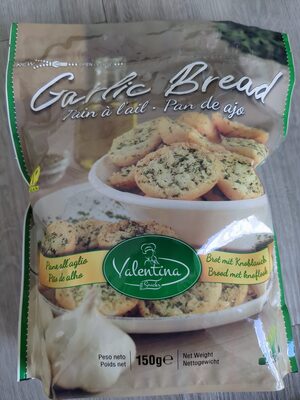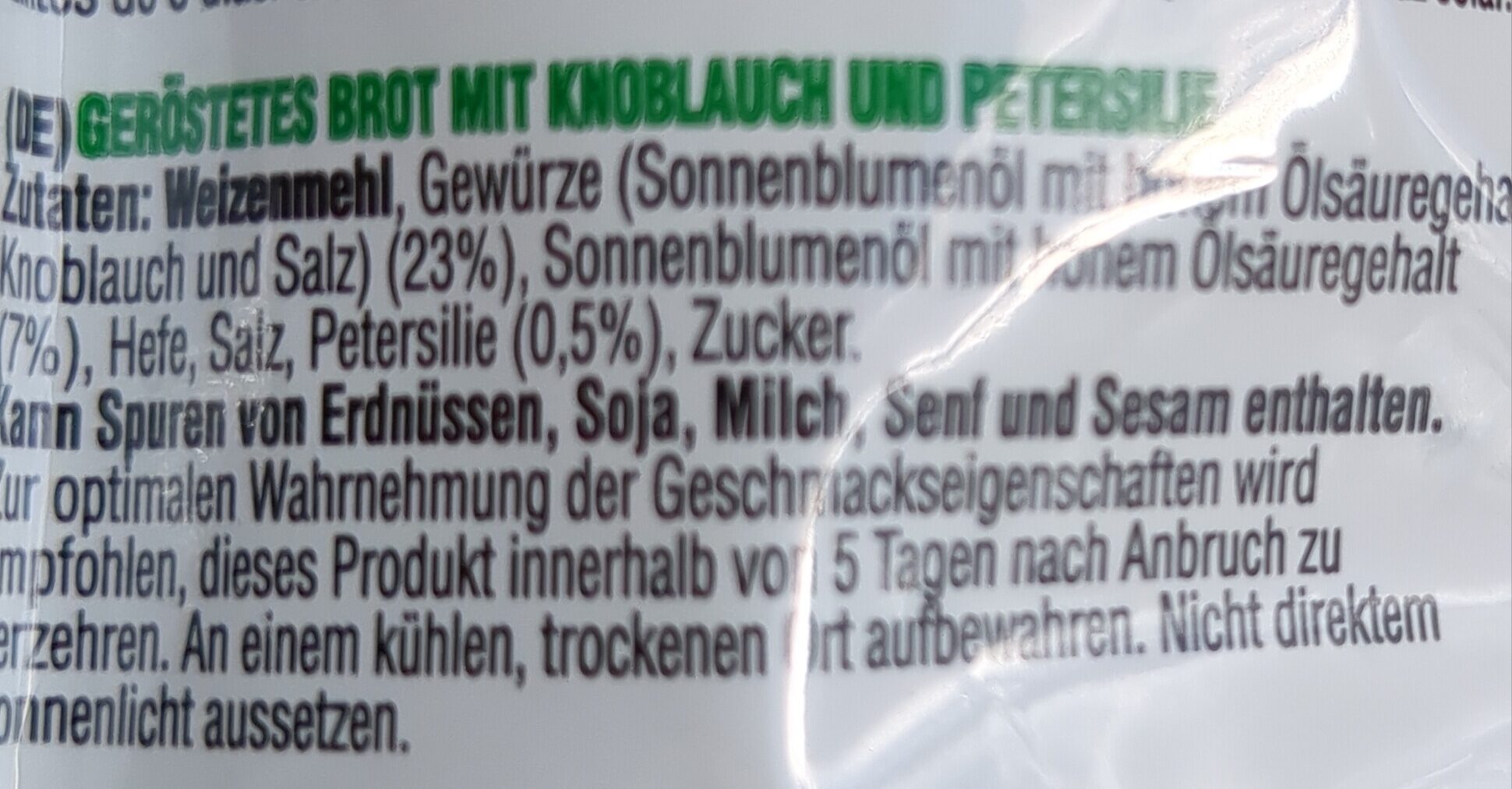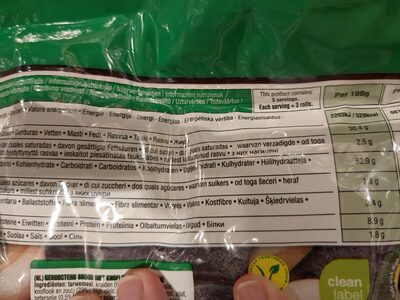Help us make food transparency the norm!
As a non-profit organization, we depend on your donations to continue informing consumers around the world about what they eat.
The food revolution starts with you!
Pan con ajo - Valentina - 150 g
Pan con ajo - Valentina - 150 g
This product page is not complete. You can help to complete it by editing it and adding more data from the photos we have, or by taking more photos using the app for Android or iPhone/iPad. Thank you!
×
Barcode: 8436551190068 (EAN / EAN-13)
Common name: pain à l'ail
Quantity: 150 g
Packaging: Plastic
Brands: Valentina
Categories: Plant-based foods and beverages, Plant-based foods, Snacks, Cereals and potatoes, Salty snacks, Appetizers, Breads, Garlic breads, Toasts
Labels, certifications, awards: Made in Spain
Manufacturing or processing places: Espagne
Stores: Boucheries André
Countries where sold: France
Matching with your preferences
Health
Ingredients
-
10 ingredients
: Weizenmehl, Gewürze (Sonnenblumenöl mit Ölsäuregehalt (Knoblauch und Salz) (23%), Sonnenblumenöl mit Olsäuregehalt (7%), Hefe, Salz, Petersilie (0,5%), Zucker. Kann Spuren von Erdnüssen, Soja, Milch, Senf und Sesam enthalten.Allergens: GlutenTraces: Milk, Mustard, Peanuts, Sesame seeds, Soybeans
Food processing
-
Processed foods
Elements that indicate the product is in the 3 - Processed foods group:
- Category: Salty snacks
- Ingredient: Salt
- Ingredient: Sugar
Food products are classified into 4 groups according to their degree of processing:
- Unprocessed or minimally processed foods
- Processed culinary ingredients
- Processed foods
- Ultra processed foods
The determination of the group is based on the category of the product and on the ingredients it contains.
Ingredients analysis
-
Palm oil free
No ingredients containing palm oil detected
Unrecognized ingredients: de:sonnenblumenöl-mit-ölsäuregehalt, de:sonnenblumenöl-mit-olsäuregehaltSome ingredients could not be recognized.
We need your help!
You can help us recognize more ingredients and better analyze the list of ingredients for this product and others:
- Edit this product page to correct spelling mistakes in the ingredients list, and/or to remove ingredients in other languages and sentences that are not related to the ingredients.
- Add new entries, synonyms or translations to our multilingual lists of ingredients, ingredient processing methods, and labels.
If you would like to help, join the #ingredients channel on our Slack discussion space and/or learn about ingredients analysis on our wiki. Thank you!
-
Vegan status unknown
Unrecognized ingredients: de:sonnenblumenöl-mit-ölsäuregehalt, de:sonnenblumenöl-mit-olsäuregehaltSome ingredients could not be recognized.
We need your help!
You can help us recognize more ingredients and better analyze the list of ingredients for this product and others:
- Edit this product page to correct spelling mistakes in the ingredients list, and/or to remove ingredients in other languages and sentences that are not related to the ingredients.
- Add new entries, synonyms or translations to our multilingual lists of ingredients, ingredient processing methods, and labels.
If you would like to help, join the #ingredients channel on our Slack discussion space and/or learn about ingredients analysis on our wiki. Thank you!
-
Vegetarian status unknown
Unrecognized ingredients: de:sonnenblumenöl-mit-ölsäuregehalt, de:sonnenblumenöl-mit-olsäuregehaltSome ingredients could not be recognized.
We need your help!
You can help us recognize more ingredients and better analyze the list of ingredients for this product and others:
- Edit this product page to correct spelling mistakes in the ingredients list, and/or to remove ingredients in other languages and sentences that are not related to the ingredients.
- Add new entries, synonyms or translations to our multilingual lists of ingredients, ingredient processing methods, and labels.
If you would like to help, join the #ingredients channel on our Slack discussion space and/or learn about ingredients analysis on our wiki. Thank you!
-
Details of the analysis of the ingredients
We need your help!
Some ingredients could not be recognized.
We need your help!
You can help us recognize more ingredients and better analyze the list of ingredients for this product and others:
- Edit this product page to correct spelling mistakes in the ingredients list, and/or to remove ingredients in other languages and sentences that are not related to the ingredients.
- Add new entries, synonyms or translations to our multilingual lists of ingredients, ingredient processing methods, and labels.
If you would like to help, join the #ingredients channel on our Slack discussion space and/or learn about ingredients analysis on our wiki. Thank you!
: Weizenmehl, Gewürze, Sonnenblumenöl mit Ölsäuregehalt (Knoblauch, Salz), Sonnenblumenöl mit Olsäuregehalt 7%, Hefe, Salz, Petersilie 0.5%, Zucker- Weizenmehl -> en:wheat-flour - vegan: yes - vegetarian: yes - ciqual_proxy_food_code: 9410 - percent_min: 12.5 - percent_max: 77.5
- Gewürze -> en:spice - vegan: yes - vegetarian: yes - percent_min: 7 - percent_max: 42.25
- Sonnenblumenöl mit Ölsäuregehalt -> de:sonnenblumenöl-mit-ölsäuregehalt - percent_min: 7 - percent_max: 30.5
- Knoblauch -> en:garlic - vegan: yes - vegetarian: yes - ciqual_food_code: 11000 - percent_min: 5.2 - percent_max: 30.5
- Salz -> en:salt - vegan: yes - vegetarian: yes - ciqual_food_code: 11058 - percent_min: 0 - percent_max: 1.8
- Sonnenblumenöl mit Olsäuregehalt -> de:sonnenblumenöl-mit-olsäuregehalt - percent_min: 7 - percent: 7 - percent_max: 7
- Hefe -> en:yeast - vegan: yes - vegetarian: yes - percent_min: 0.5 - percent_max: 7
- Salz -> en:salt - vegan: yes - vegetarian: yes - ciqual_food_code: 11058 - percent_min: 0.5 - percent_max: 1.8
- Petersilie -> en:parsley - vegan: yes - vegetarian: yes - ciqual_proxy_food_code: 11014 - percent_min: 0.5 - percent: 0.5 - percent_max: 0.5
- Zucker -> en:sugar - vegan: yes - vegetarian: yes - ciqual_proxy_food_code: 31016 - percent_min: 0 - percent_max: 0.5
Nutrition
-
Poor nutritional quality
⚠ ️Warning: the amount of fruits, vegetables and nuts is not specified on the label, it was estimated from the list of ingredients: 12This product is not considered a beverage for the calculation of the Nutri-Score.
Positive points: 3
- Proteins: 5 / 5 (value: 8.9, rounded value: 8.9)
- Fiber: 3 / 5 (value: 3.4, rounded value: 3.4)
- Fruits, vegetables, nuts, and colza/walnut/olive oils: 0 / 5 (value: 12.44375, rounded value: 12.4)
Negative points: 15
- Energy: 6 / 10 (value: 2203, rounded value: 2203)
- Sugars: 0 / 10 (value: 1.8, rounded value: 1.8)
- Saturated fat: 2 / 10 (value: 2.5, rounded value: 2.5)
- Sodium: 7 / 10 (value: 720, rounded value: 720)
The points for proteins are not counted because the negative points are greater or equal to 11.
Nutritional score: (15 - 3)
Nutri-Score:
-
Nutrient levels
-
Fat in high quantity (30.4%)
What you need to know- A high consumption of fat, especially saturated fats, can raise cholesterol, which increases the risk of heart diseases.
Recommendation: Limit the consumption of fat and saturated fat- Choose products with lower fat and saturated fat content.
-
Saturated fat in moderate quantity (2.5%)
What you need to know- A high consumption of fat, especially saturated fats, can raise cholesterol, which increases the risk of heart diseases.
Recommendation: Limit the consumption of fat and saturated fat- Choose products with lower fat and saturated fat content.
-
Sugars in low quantity (1.8%)
What you need to know- A high consumption of sugar can cause weight gain and tooth decay. It also augments the risk of type 2 diabetes and cardio-vascular diseases.
Recommendation: Limit the consumption of sugar and sugary drinks- Sugary drinks (such as sodas, fruit beverages, and fruit juices and nectars) should be limited as much as possible (no more than 1 glass a day).
- Choose products with lower sugar content and reduce the consumption of products with added sugars.
-
Salt in high quantity (1.8%)
What you need to know- A high consumption of salt (or sodium) can cause raised blood pressure, which can increase the risk of heart disease and stroke.
- Many people who have high blood pressure do not know it, as there are often no symptoms.
- Most people consume too much salt (on average 9 to 12 grams per day), around twice the recommended maximum level of intake.
Recommendation: Limit the consumption of salt and salted food- Reduce the quantity of salt used when cooking, and don't salt again at the table.
- Limit the consumption of salty snacks and choose products with lower salt content.
-
-
Nutrition facts
Nutrition facts As sold
for 100 g / 100 mlCompared to: Garlic breads Energy 2,203 kj
(528 kcal)+56% Fat 30.4 g +114% Saturated fat 2.5 g -50% Carbohydrates 52.9 g +25% Sugars 1.8 g -29% Fiber 3.4 g +52% Proteins 8.9 g +9% Salt 1.8 g +71% Fruits‚ vegetables‚ nuts and rapeseed‚ walnut and olive oils (estimate from ingredients list analysis) 12.444 %
Environment
-
Eco-Score B - Low environmental impact
⚠ ️Select a country in order to include the full impact of transportation.The Eco-Score is an experimental score that summarizes the environmental impacts of food products.→ The Eco-Score was initially developped for France and it is being extended to other European countries. The Eco-Score formula is subject to change as it is regularly improved to make it more precise and better suited to each country.Life cycle analysis
-
Average impact of products of the same category: A (Score: 92/100)
Category: Wheat swedish toast
Category: Wheat swedish toast
- PEF environmental score: 0.18 (the lower the score, the lower the impact)
- including impact on climate change: 1.27 kg CO2 eq/kg of product
Stage Impact Agriculture
66.6 %Processing
20.6 %Packaging
6.1 %Transportation
6.3 %Distribution
0.4 %Consumption
0.0 %
Bonuses and maluses
-
Missing origins of ingredients information
Malus: -5
⚠ ️ The origins of the ingredients of this product are not indicated.
If they are indicated on the packaging, you can modify the product sheet and add them.
If you are the manufacturer of this product, you can send us the information with our free platform for producers.
-
Packaging with a medium impact
Malus: -10
Shape Material Recycling Impact Unknown Plastic High ⚠ ️ The information about the packaging of this product is not sufficiently precise (exact shapes and materials of all components of the packaging).⚠ ️ For a more precise calculation of the Eco-Score, you can modify the product page and add them.
If you are the manufacturer of this product, you can send us the information with our free platform for producers.
Eco-Score for this product
-
Impact for this product: B (Score: 77/100)
Product: Pan con ajo - Valentina - 150 g
Life cycle analysis score: 92
Sum of bonuses and maluses: -15
Final score: 77/100
-
Carbon footprint
-
Equal to driving 0.7 km in a petrol car
127 g CO² per 100g of product
The carbon emission figure comes from ADEME's Agribalyse database, for the category: Wheat swedish toast (Source: ADEME Agribalyse Database)
Stage Impact Agriculture
64.8 %Processing
15.4 %Packaging
8.7 %Transportation
10.8 %Distribution
0.4 %Consumption
0.0 %
Packaging
-
Packaging with a medium impact
-
Packaging parts
(Plastic)
-
Packaging materials
Material % Packaging weight Packaging weight per 100 g of product Plastic
-
Transportation
-
Origins of ingredients
Missing origins of ingredients information
⚠ ️ The origins of the ingredients of this product are not indicated.
If they are indicated on the packaging, you can modify the product sheet and add them.
If you are the manufacturer of this product, you can send us the information with our free platform for producers.Add the origins of ingredients for this product Add the origins of ingredients for this product
Report a problem
-
Incomplete or incorrect information?
Category, labels, ingredients, allergens, nutritional information, photos etc.
If the information does not match the information on the packaging, please complete or correct it. Open Food Facts is a collaborative database, and every contribution is useful for all.
Data sources
Product added on by agamitsudo
Last edit of product page on by freezinglava.
Product page also edited by kiliweb, packbot, roboto-app, yuka.WjZvcFBvSWd2ZVExb05zWjdrcjc5NGgyd0ppSVVUS2FFdmNOSWc9PQ, yuka.sY2b0xO6T85zoF3NwEKvlkZdCPTkoTPObBrVkne29vWKDp7sfvJYxdT8Gqo, yuka.sY2b0xO6T85zoF3NwEKvlnd5cNXGmzfmaCDuoVTS1NWkF6zHfeh2zobfAqs.











